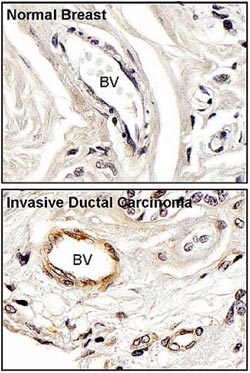Putting a brake on tumor spread

Normal breast tissue and invasive ductal carcinoma stained brown with antibodies to activated FAK. Blood vessels are indicated by BV.<br><br>Credit: David Schlaepfer, UC San Diego.<br>
The findings are published in this week's online issue of the Journal of Cell Biology.
Blood vessels are tightly lined with endothelial cells, which form a permeability barrier to circulating cells and molecules. “Our studies show that pharmacological or genetic inhibition of the endothelial protein focal adhesion kinase, or FAK, prevents tumor spread by enhancing the vessel barrier function.”
The researchers found that selective FAK inhibition within endothelial cells prevented spontaneous tumor metastasis without alterations in tumor size. Schlaepfer, with colleagues at the UC San Diego Moores Cancer Center, is exploring whether inhibiting targets like FAK, which has important regulatory functions in both tumor cells and blood vessels, might provide a dual mechanism for preventing both cancer growth and spread.
Using mouse models of breast, ovarian and melanoma tumors, first author Christine Jean, PhD, showed that FAK activity was elevated in the blood vessels surrounding tumors, compared to normal tissue. FAK modifies the function of other cellular proteins, and researchers identified a previously unknown FAK target: a protein called vascular endothelial cadherin (VE-cadherin) that helps endothelial cells fasten tightly together. When modified by FAK, VE-cadherin complexes fall apart and blood vessels become leaky. Inactivating FAK within endothelial cells prevented this unwanted permeability and helped block the ability of tumor cells to pass through endothelial cell barriers.
Schlaepfer said the research has major clinical implications: Metastasis – or the spread of a cancer from its originating site to other parts of the body – is responsible for 90 percent of cancer-related deaths. “This fact alone underscores the need for a better mechanistic understanding of the metastatic process,” Schlaepfer said. He noted that several FAK-inhibitors are currently being tested in clinical trials.
Co-authors include Xiao Lei Chen, Isabelle Tancioni, Sean Uryu, Christine Lawson, Kristy K. Ward and Nichol L.G. Miller, UC San Diego Moores Cancer Center; Ju-Ock Nam, Kyungpook National University, Korea; Colin T. Walsh, Binomics, San Diego; Majid Ghassemian, UCSD Department of Chemistry and Biochemistry; Patrick Turowski, University College London; Elisabetta Dejana, University of Milan; Sara Weis and David A. Cheresh, Department of Pathology, UC San Diego Moores Cancer Center.
Funding for this research came, in part, from the National Institutes of Health (grants RO1 HL093156, RO1 CA102310, and R37 CA50286), Italian Association for Cancer Research and The European Research Council, American Heart Association, Susan G. Komen for the Cure, Canadian Institutes of Health Research, Ruth Kirschstein National Research Service Award and Nine Girls Ask?
Media Contact
More Information:
http://www.ucsd.eduAll latest news from the category: Life Sciences and Chemistry
Articles and reports from the Life Sciences and chemistry area deal with applied and basic research into modern biology, chemistry and human medicine.
Valuable information can be found on a range of life sciences fields including bacteriology, biochemistry, bionics, bioinformatics, biophysics, biotechnology, genetics, geobotany, human biology, marine biology, microbiology, molecular biology, cellular biology, zoology, bioinorganic chemistry, microchemistry and environmental chemistry.
Newest articles

After 25 years, researchers uncover genetic cause of rare neurological disease
Some families call it a trial of faith. Others just call it a curse. The progressive neurological disease known as spinocerebellar ataxia 4 (SCA4) is a rare condition, but its…

Lower dose of mpox vaccine is safe
… and generates six-week antibody response equivalent to standard regimen. Study highlights need for defined markers of mpox immunity to inform public health use. A dose-sparing intradermal mpox vaccination regimen…

Efficient, sustainable and cost-effective hybrid energy storage system for modern power grids
EU project HyFlow: Over three years of research, the consortium of the EU project HyFlow has successfully developed a highly efficient, sustainable, and cost-effective hybrid energy storage system (HESS) that…





















